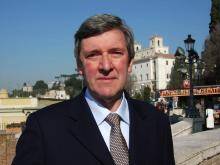Twelve years ago Pope John Paul II made a last-ditch effort to prevent the war in Iraq. After speaking out publicly and getting Holy See officials to speak with many governments, he sent his personal envoy to talk with President George W. Bush to prevent a war that the pope and his advisors foresaw would have disastrous consequences.
His envoy, Cardinal Pio Laghi, met top administration officials—Colin Powell, the secretary of state, and Condolezza Rice, the national security advisor—and, on March 5, 2003, the president. The cardinal told them clearly that the Holy See believed a war would have three negative consequences: it would bring greater suffering to the Iraqi people; it would seriously damage Muslim-Christian relations; it could provoke geo-strategic disorder in the region.
The Holy See’s analysis was dismissed out of hand; the decision had been taken to go to war. President Bush and his administration expected the war to end quickly, believed Christian-Muslim relations would not suffer and predicted the region would be a safer, more stable place.
Events since then have shown that the Holy See’s analysis was accurate, even prophetic. Peace is not on the horizon, Muslim-Christian relations have suffered greatly, and there is widespread disorder in the region.
Pope Francis is profoundly concerned over the deteriorating situation in the Middle East. He wants to do everything possible to promote peace there. He intervened to prevent the United States from bombing in Syria. He has sought ways to promote a just, lasting peace between Israelis and Palestinians. He expressed support for the nuclear agreement between Iran and the U.N. Security Council’s permanent members plus Germany. He called for stopping the flow of arms into Iraq and Syria.
He is deeply concerned about the plight of Christians and other minorities in the Middle East, particularly in Syria and Iraq. The pope spoke forcefully about this in St. Peter’s Basilica on April 12 at a Mass about the centenary of the genocide of Armenians. He sees a disturbing parallel between what happened to them, the world’s first Christian nation, during World War I and what’s happening to Christians in the Middle East today, also at “a time of war, a third world war that is being fought piecemeal, one in which we daily witness savage crimes, brutal massacres and senseless destruction.”
“Sadly, today too,” he said, “we hear the muffled and forgotten cry of so many of our defenseless brothers and sisters who, on account of their faith in Christ or their ethnic origin, are publicly and ruthlessly put to death—decapitated, crucified, burned alive—or forced to leave their homeland.”
“Today too,” he stated, “we are experiencing a sort of genocide created by general and collective indifference, by the complicit silence of Cain, who cries out: ‘What does it matter to me? Am I my brother’s keeper?’”
Just as Benedict XV asked the Ottoman authorities to stop the slaughter of Armenians and John Paul II appealed to President Bush not to go to war against Iraq, so today Francis is calling on world leaders to stop the killings and persecution in the Middle East.
Linking the past to the present in a message to Armenians on April 12, Francis said it is the responsibility not only of the Armenian people but also of the universal church and the world “to remember” what happened in 1915 “so that the warnings from this tragedy will protect us from falling into a similar horror, which offends against God and human dignity.”
“Today, in fact,” he said, “these conflicts at times degenerate into unjustifiable violence, stirred up by exploiting ethnic and religious differences.” He said, “All who are heads of state and of international organizations are called to oppose such crimes with a firm sense of duty, without ceding to ambiguity or compromise.”
Returning from Korea last August, he told the press: “It’s licit to stop the unjust aggressor. I underline the verb stop. I do not say bomb, make war.... I say stop by some means.” He said those means “have to be evaluated” at the United Nations, “one nation alone cannot judge how to stop an unjust aggressor.”
The Ottoman and American leaders ignored past papal appeals. Will today’s leaders listen to Francis?








